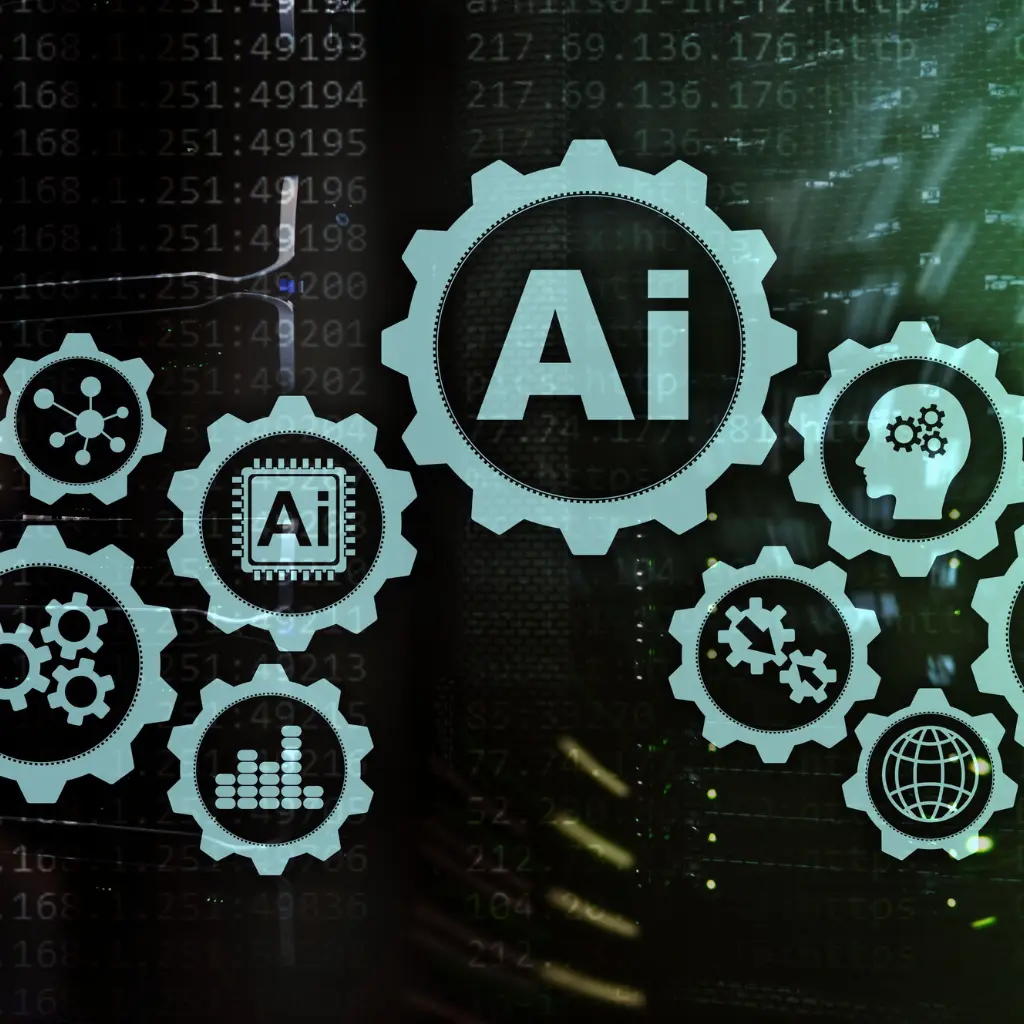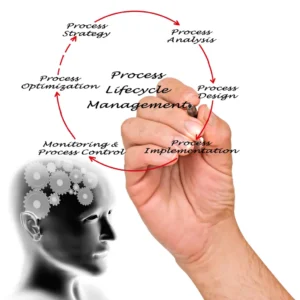
Revolutionizing Efficiency
The Power of AI Tools for Intelligent Process Automation (IPA)
In the fast-paced landscape of modern business, integrating AI Tools for Intelligent Process Automation (IPA) has become a cornerstone of innovation.
These sophisticated tools, designed to enhance operational efficiency, reshape how organizations approach tasks. AI-driven automation is at the forefront of transformative change, from mitigating errors and ensuring compliance to fostering adaptability and scaling seamlessly.
This article delves into the effects that AI tools have on business processes. Whether you’re a business professional or a technical solution provider, understanding the nuances of AI’s contribution to enhanced efficiency is crucial in navigating the complexities of today’s competitive business environment.
Join us on a journey through the intricacies of AI-driven automation and discover how these tools unlock unprecedented levels of productivity and strategic advantage.
Maximizing Efficiency
In today’s business environment, the significance of AI Tools for Intelligent Process Automation (IPA) cannot be overstated. These advanced technologies pave the way for enhanced efficiency, revolutionizing how tasks are managed and executed.
AI-driven automation tools tackle repetitive and mundane tasks with exceptional speed, outpacing human capabilities. This swift handling of routine operations results in a substantial boost to operational efficiency. As a result, employees are freed from the tedium of repetitive tasks.
The streamlined approach that AI brings to automation accelerates processes and minimizes errors associated with manual execution. This reduction in error rates contributes further to operational efficiency, ensuring that tasks are completed accurately and promptly.
Incorporating AI Tools for Intelligent Process Automation (IPA) into your business optimizes existing workflows and empowers your workforce. By automating routine tasks, these tools unlock the potential for increased employee productivity and job satisfaction. The ripple effect is an organization that operates with a leaner and more focused approach, positioning itself for sustained success in today’s competitive landscape.
In conclusion, adopting AI Tools for Intelligent Process Automation represents a strategic move towards achieving unparalleled efficiency in business operations. Embrace these transformative technologies to propel your organization into a future where efficiency is not just a goal but a defining characteristic.
Process Optimization
Process optimization takes centre stage in the AI Tools for Intelligent Process Automation (IPA) era. Armed with the ability to dissect large datasets, AI catalyzes transformative change.
AI’s analytical prowess delves into vast datasets, discerning patterns, trends, and untapped potential. This critical capability allows businesses to identify areas for improvement within their processes. A sophisticated approach to optimization emerges through the application of machine learning algorithms.
The essence of optimization lies in the elimination of bottlenecks. AI Tools for Intelligent Process Automation (IPA) pinpoint inefficiencies, enabling businesses to streamline workflows. This targeted enhancement contributes to a seamless operation where tasks flow effortlessly, reducing operational friction.
Beyond bottleneck eradication, the impact extends to overall performance elevation. The machine learning algorithms refine current processes and anticipate future demands. This foresight positions businesses to adapt swiftly, maintaining peak efficiency in a dynamic landscape.
Integrating AI Tools for Intelligent Process Automation propels businesses towards a future where optimization is not a goal but an ongoing, data-driven refinement. Embrace these tools to unleash the full potential of your processes and cultivate a resilient and efficient organizational ecosystem.
Cost Reduction Strategies
The impact of AI Tools for Intelligent Process Automation (IPA) on cost reduction is a transformative narrative in modern business dynamics. Automation emerges as the linchpin for achieving substantial cost savings.
By entrusting routine tasks to AI tools, businesses unlock a pathway to heightened productivity. The efficiency gained translates into a reduced reliance on an additional workforce, inherently lowering labour costs. This strategic shift in task allocation optimizes human resources, directing skills toward more value-driven endeavours.
Operational expenses undergo a paradigm shift as routine processes are seamlessly automated. AI Tools for Intelligent Process Automation (IPA) redefine the cost structure by eliminating the need for extensive manual intervention. The resultant leaner operation conserves resources and positions businesses to reallocate funds for strategic initiatives and innovation.
The financial benefits extend beyond the immediate labour cost reduction. With streamlined processes, the potential for errors decreases, averting the costly consequences associated with manual inaccuracies. This dual impact underscores the holistic approach AI-driven automation takes towards cost reduction.
In summary, embracing AI Tools for Intelligent Process Automation represents a pivotal strategy for businesses seeking efficiency and a transformative approach to cost management. It’s a journey towards a leaner, more agile, and financially astute operational landscape.
Elevating Decision-Making
In the AI Tools for Intelligent Process Automation (IPA) era, data-driven decision-making has become a cornerstone of organizational success. AI’s capability to process extensive data sets elevates decision-making to a new echelon.
AI tools dissect vast data, unravelling valuable insights crucial for informed decision-making. This data-driven approach ensures that business strategies are intuitive and deeply rooted in empirical evidence. By relying on AI for data processing, organizations fortify their decision-making processes with accuracy and relevance.
Integrating AI into decision-making doesn’t just streamline processes; it fundamentally transforms the effectiveness of organizational strategies. Data-driven decisions foster adaptability, enabling businesses to navigate complexities with precision. The result is a strategic landscape where every decision is underpinned by actionable intelligence.
This data-centric approach extends beyond immediate decision-making. AI Tools for Intelligent Process Automation instil a culture of continuous improvement. Insights from data analysis pave the way for refining strategies, optimizing operations, and staying ahead in a competitive environment.
In conclusion, the marriage of AI Tools for Intelligent Process Automation and data-driven decision-making is a strategic imperative. It not only refines the decision-making process but sets the stage for organizational resilience and sustained success in a data-centric business landscape.
Mitigating Risks
In business operations, precision is paramount, and AI Tools for Intelligent Process Automation (IPA) emerge as the guardians against errors. AI systems, designed for accuracy, can mitigate the risks of human errors.
Tasks demanding precision, like data entry and financial transactions, are susceptible to human fallibility. AI, with its unwavering precision, steps in to minimize these risks. Automated systems ensure data accuracy, reducing the likelihood of costly mistakes in financial processes.
The inherent reliability of AI systems transforms error reduction from an aspiration to an achievable reality. By entrusting intricate tasks to AI Tools for Intelligent Process Automation, organizations create a shield against inaccuracies that could compromise financial integrity or data reliability.
The significance of error reduction extends beyond immediate financial implications. Trust in business processes, client relationships, and regulatory compliance hinges on precision. AI’s role in minimizing errors instils confidence in stakeholders, solidifying the credibility of the entire operational ecosystem.
In conclusion, incorporating AI Tools for Intelligent Process Automation is a strategic imperative, especially in tasks demanding precision. It’s a proactive measure to fortify operational processes, ensuring a future where errors are minimized and business integrity is upheld with unwavering precision.
Enhanced Customer Experiences
In pursuing superior customer experiences, AI Tools for Intelligent Process Automation (IPA) shine as transformative assets. The infusion of AI-powered chatbots, virtual assistants, and recommendation systems marks a paradigm shift in how businesses engage with their clientele.
Automation plays a pivotal role in expediting customer interactions. AI-driven systems ensure faster response times, addressing queries and concerns promptly. This immediacy contributes significantly to customer satisfaction, fostering a positive brand perception.
Personalization takes centre stage as AI analyzes data to tailor interactions. Customer preferences are anticipated, leading to a more personalized and engaging experience. AI enables businesses to resonate with their customers more deeply, from product recommendations to communication styles.
The accessibility factor is revolutionized with AI’s capability to operate 24/7. Unrestricted by time zones or business hours, automated systems provide constant availability. This round-the-clock engagement ensures that customers receive assistance when needed, enhancing overall satisfaction.
The synergy of AI Tools for Intelligent Process Automation and customer experience isn’t just a convenience—it’s a strategic imperative. Beyond operational efficiency, it builds lasting connections, turning customers loyal advocates. In a landscape where customer loyalty is paramount, AI catalyzes sustained success.
Adaptive Power
In the dynamic business landscape, adaptability is the cornerstone of success. AI Tools for Intelligent Process Automation (IPA) emerge as the catalysts for seamless transitions. Business environments are ever-evolving, and swiftly adapting to change is crucial.
AI’s adaptability is showcased in its capacity to quickly embrace changes in business processes. Automation tools driven by AI stand out for their flexibility. They can be effortlessly adjusted or reconfigured to accommodate new methods or modifications in existing workflows.
The swift response to change is a convenience and a strategic advantage. In an era where market dynamics shift rapidly, organizations equipped with AI Tools for Intelligent Process Automation gain a competitive edge.
The simplicity of adjusting automation tools ensures that organizations can stay ahead in the face of evolving customer demands, industry regulations, or technological advancements. It’s not merely about automation but the adaptability that ensures sustained relevance and resilience in a fluctuating business landscape.
In summary, integrating AI Tools for Intelligent Process Automation is synonymous with future-proofing business operations. The adaptability they bring empowers organizations to navigate change seamlessly, fostering a culture of innovation and resilience in the face of uncertainty.
Pinnacle of Growth
In the business growth journey, scalability is a pivotal factor. AI Tools for Intelligent Process Automation (IPA) emerge as the linchpin for seamless expansion. As businesses evolve, so do the demands on their operational processes.
AI-driven automation tools exhibit a unique capability: scalability without resource proportionality. As business volumes surge, automation tools can scale to handle more significant tasks. The beauty lies in the fact that this scalability doesn’t necessitate a parallel increase in resources.
Traditional scaling often requires a proportional boost in human resources and infrastructure. AI Tools for Intelligent Process Automation redefine this norm. Automated systems can adeptly manage increased workloads, maintaining efficiency without an exponential cost rise.
This scalability extends beyond mere task management. It’s a strategic adaptation to evolving business needs. AI-driven automation ensures efficiency, reliability, and cost-effectiveness for businesses facing changing demand.
The significance of scalability isn’t confined to current demands but anticipates future requirements. Organizations equipped with AI Tools for Intelligent Process Automation lay the foundation for sustainable growth. It’s not just about meeting current needs; it’s about embracing the future with a scalable, adaptable operational framework.
Risk Management
Compliance and risk management are sentinels of stability in the intricate business world. AI Tools for Intelligent Process Automation (IPA) emerge as indispensable allies in navigating these critical domains.
Ensuring compliance with regulations is a formidable task, often laden with complexities. AI facilitates this process by automating monitoring and reporting. This ensures adherence to regulatory frameworks and expedites the otherwise time-intensive compliance procedures.
With their analytical prowess, AI algorithms become vigilant guardians in risk management. By systematically analyzing data, these algorithms can identify potential risks and highlight impending issues. This proactive approach empowers businesses to manage and mitigate risks before they escalate, safeguarding financial stability and reputation.
The role of AI Tools for Intelligent Process Automation extends beyond mere risk identification. They instil a culture of foresight, enabling organizations to stay ahead of compliance changes and emerging risks. This strategic alignment with risk management is not just a shield against uncertainties; it’s a proactive stance in the face of an ever-evolving business landscape.
Integrating AI into compliance and risk management is not a luxury but a necessity. It’s a strategic move towards fortified resilience, ensuring businesses navigate regulatory intricacies and potential risks precisely and confidently.
Conclusion
In conclusion, AI Tools for Intelligent Process Automation (IPA) emerge as transformative assets, revolutionizing business efficiency across critical domains.
From enhancing operational productivity through error reduction to navigating change seamlessly and ensuring compliance and risk management, these tools redefine how organizations operate. The adaptability of AI-driven automation ensures scalability, allowing businesses to meet evolving needs without proportional resource increases.
Moreover, the impact extends to customer experiences, with AI-powered chatbots and recommendation systems elevating interactions to new heights. As organizations grow, the scalability of AI Tools becomes a strategic imperative, allowing for agile expansion. This not only reduces costs but also positions businesses for sustained success.
Furthermore, AI processes vast datasets in decision-making, ensuring strategies are grounded in data. The precision of AI in tasks demanding accuracy, such as financial transactions, mitigates risks and fortifies the integrity of operations.
In a holistic sense, integrating AI Tools for Intelligent Process Automation isn’t just about efficiency; it’s a strategic move towards resilience, adaptability, and customer-centric operations. By embracing these tools, businesses pave the way for a future where data-driven decision-making, scalability, and enhanced customer experiences converge to define operational excellence in the ever-evolving business landscape.
Related Articles
- Choosing the Right Automation Tool in 7 Steps
- A 9-Step Guide to IPA Implementation: Energise Your Operations
- Navigating the Roadblocks of IPA – The Top 9 Challenges
- AI in Intelligent Process Automation – Unleash the Power of AI
- 9 IPA Examples in Small-Scale Industries
- Power of Intelligent Business Process Automation – Efficiency
- AI Business Process Management: Unleashing the Power
- Business Process Management with AI Integration
- AI for Reengineering Business Processes
- Hyperautomation: Redefining BPM with AI
- The Role of AI in Business Process Modelling
- AI-driven Customer Onboarding – Unleash the Power of AI
- Effective Process mapping in Intelligent Process Automation
- Intelligent Process Automation Adoption – The Best Strategy Guide
- TechInfra in IPA: A Comprehensive Guide
- Elevating Intelligent Automation with Continuous Improvement
- Comprehensive Approach to Cost-Benefit Analysis in IPA
- Vendor Selection in IPA – Comprehensive Guide
- Implementing Agile in Intelligent Process Automation (IPA)
- Scalability and Integration in Intelligent Process Automation
- Cognitive Automation in IPA: Innovating Ethical Efficiency
- Mastering Symphony: Bot Development in IPA Unveiled
- UI/UX Mastery in IPA: Elevating Automation Experiences
- Compliance and Security in IPA – A Guide Ensuring Trust
- Impact of Performance Monitoring and Analytics in IPA
- Driving Success: Data Management in IPA
- Crucial Role: Documentation in IPA Triumph
- Optimizing IPA – Continuous Improvement Strategies























